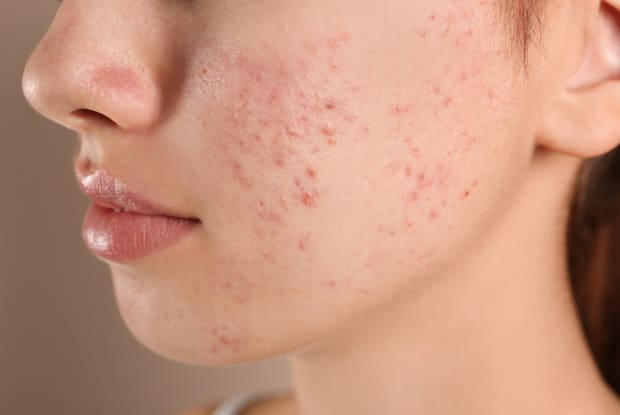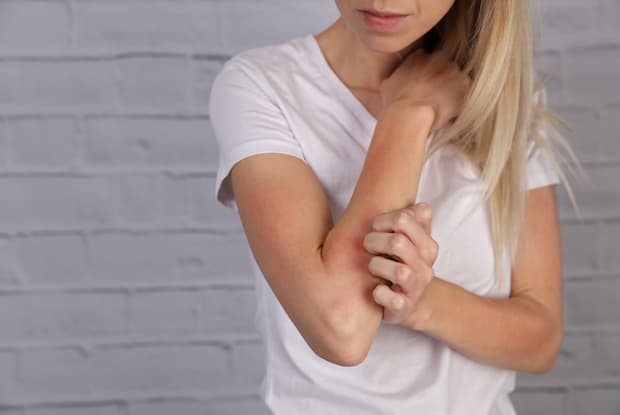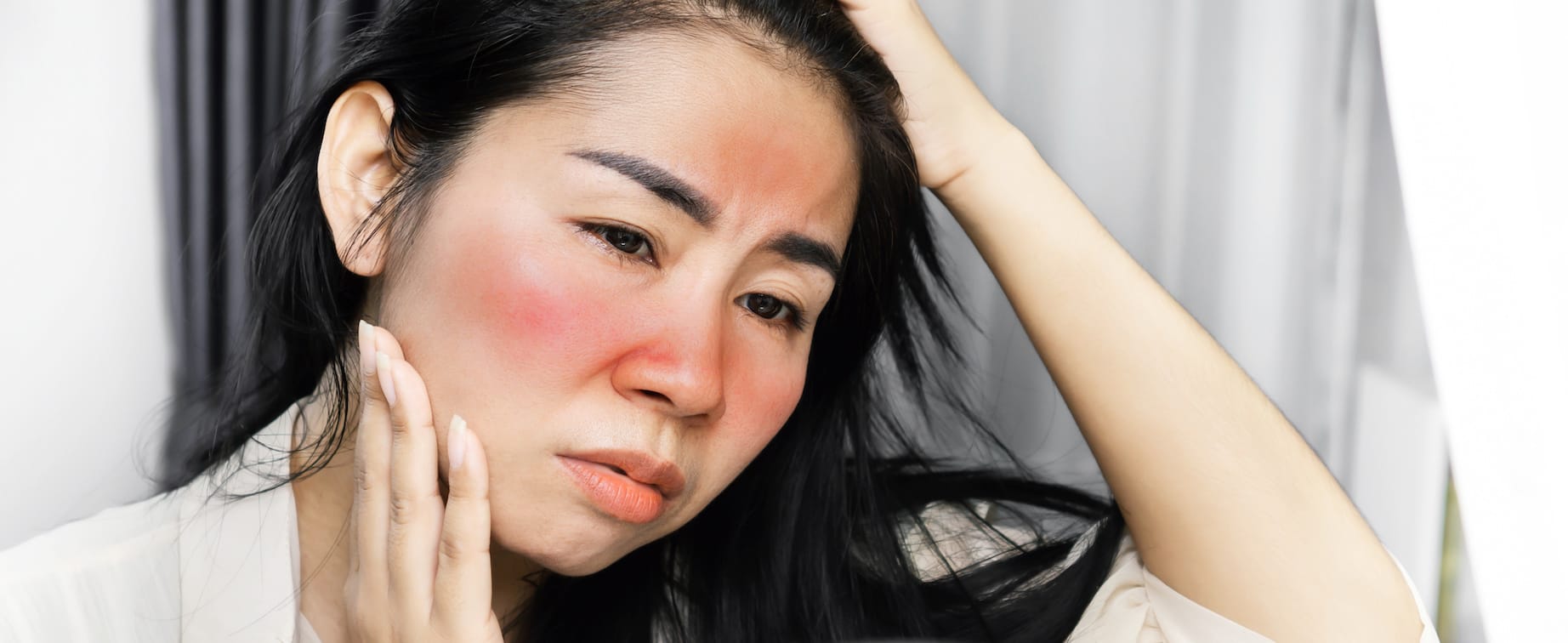Table of Contents
II. The importance of mental health
III. Low self-esteem and body image
Visible skin conditions
Skin conditions can have a profound effect on a person’s self-esteem and body image. Acne or rosacea can make someone want to cover up their face and hide their affected body area to others. Medications like Azelex and Mirvaso can help with symptoms, but they do not cure the mental component of skin disorders. Having a chronic skin condition can have long-lasting repercussions on a person’s mental state. This is an unfortunate phenomenon because 85 percent of people between the ages of 12 and 25 develop acne. The most common types of visible skin disorders can include:
Eczema (Atopic dermatitis): The cause of this disorder may be linked to the immune system’s response to an irritant. Eczema causes dry, itchy skin along with red, rash-like patches. Eczema may also accompany hay fever or asthma.
Acne: This is the most common type of dermatological problem, and most of us experience acne to some degree during adolescence. It can often persist into adulthood and leave scars throughout the affected areas. Cystic acne occurs when these sores happen deep under the skin.
Psoriasis: Psoriasis results from an excess buildup of skin tissue. This extra skin creates a red, splotchy appearance, which then causes flaking skin.
Rosacea: This is a chronic skin disorder involving red bumps on the skin and redness of the face. Rosacea usually happens on the cheeks, nose, and forehead. [1]

The importance of mental health
Today people are more willing to talk about the importance of mental health, especially in young people. The majority of skin conditions occur during adolescence, which is already a precarious time for body image. Poor body image is often associated with girls, but boys can also suffer from it. Skin conditions like acne do not discriminate based on gender and can affect anyone.
Skin conditions, especially acne, affect adolescents at a crucial period in the development of their personalities. Peer acceptance is paramount in this time of life, and unfortunately, many young people associate physical “attractiveness” with social status.
Low self-esteem and body image
Parents of teenagers with acne should look out for self-esteem issues in their children. Disfiguring skin conditions can occur at any age, so you may have to examine your behaviors to determine if you are experiencing the psychological effects of acne. These effects may manifest themselves in the following ways:
- People with skin conditions may be embarrassed when interacting with other people and avoid eye contact.
- Some acne patients grow their hair long to cover their faces.
- Girls may wear heavy makeup to disguise their pimples, even though it aggravates their acne.
- Acne of the back, legs, or chest (truncal acne) may prevent people from participating in any sport that requires the use of a locker room.
Social withdrawal can often occur, primarily when a skin condition affects the face. Feeling self-conscious during a formative time like the teenage years can lead to a lack of self-confidence. This lack of self-confidence can result in a lack of social bonds with their peers. Skin conditions may seem like a fleeting condition that everyone overcomes, but it can have long-lasting effects on a person’s education and work.
- Some children with skin issues may refuse to go to school and have poor academic performance.
- Acne may reduce career choices, ruling out jobs that may rely upon personal appearance.
- People who have acne have a higher rate of unemployment than people who do not have acne.
- Young adults with acne may feel like their acne is unacceptable because they think they should have “grown out of it.”
- The lack of confidence that comes with skin conditions may translate to potential employers, resulting in a lack of job opportunities. [2]
Psychodermatology
Psychodermatology is a relatively new discipline in the world of psychosomatic medicine. This branch of medicine examines the interaction between the skin and the mind. Psychodermatology is bringing attention to the mental effect of skin conditions. This field of medicine proves that skin integrates environmental cues and transmits intrinsic conditions to the outside world.

The prevalence of psychological factors on skin conditions is not fully known, but some studies show that 25 to 33 percent of skin disorders are influenced in some way by psychological components. Stress and anxiety often accompany skin disorders, and psychodermatology research shows that stimuli received in the skin can influence the endocrine, immune, and nervous system.
a. Classification
Psychophysiological disorders: This disorder is exacerbated by psychological stress. This signifies a clear association between anxiety and skin disorder. Some common examples that fall under this category include atopic dermatitis, psoriasis, and acne.
Dermatological disorders with psychiatric symptoms: This type is characterized by an increase in emotional problems because of a skin disease. The psychological effects are more severe than the physical effects.
Psychiatric disorders with dermatological symptoms: This type of disorder involves self-inflicted skin disorders. Examples of this include body dysmorphic disorder and trichotillomania. [3]
Psychodermatology is necessary to understand the mental side effects of having a skin condition. Anxiety and depression can cause an inflammatory response in the body, which can weaken the skin’s barrier and make the skin more susceptible to irritants. Anxiety around your skin condition can further irritate your skin, creating a cycle that may be hard to break.
Treatment
Skin conditions can be hard to remedy, and mental effects only increase the difficulty of day to day life. There are several drugs available to treat skin disorders like acne and rosacea, but supplementary treatments for the mental side effects may also be beneficial. Please consult your doctor for advice on how to address all aspects of your skin disorder. [4]

a. Medications
There are many drug treatments out there for common conditions, like acne and rosacea. Topical gels are often prescribed and can include Azelex and Mirvaso. These drugs are applied directly to the skin and reduce redness by constricting blood vessels. Azelex also contains azelaic acid that controls pimples.
Antibiotics may also be helpful if bacteria are causing unsightly lesions on the body. Laser and light-based therapies may also help reduce the redness of enlarged blood vessels. This treatment requires several sessions for results, and insurance usually does not cover the cost. Repeat treatments may be needed to maintain the improved appearance of your skin. [5]
b. Therapy
Psychodermatologists often try to treat both psychological and dermatological symptoms at once. Medications like Azelex can help with the skin side of the disorders, but therapeutic techniques like cognitive-behavioral therapy (CBT) can help with the mental.
CBT is a short-term, goal-oriented psychotherapy that helps you problem solve the stressors in your life. CBT works by changing people’s attitudes and behaviors by targeting specific images and beliefs that can affect the way a person deals with emotional problems. A therapist can use this method to help a person with a skin condition to pinpoint how their condition affects them and give them steps to improve their self-esteem and social anxiety. [6]
The content in this article is intended for informational purposes only. This website does not provide medical advice. In all circumstances, you should always seek the advice of your physician and/or other qualified health professionals(s) for drug, medical condition, or treatment advice. The content provided on this website is not a substitute for professional medical advice, diagnosis or treatment.
